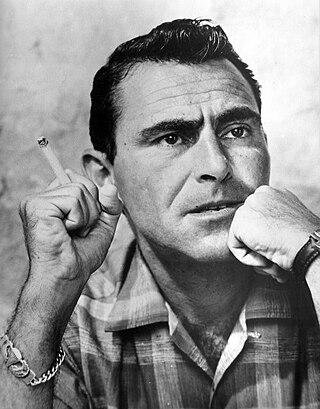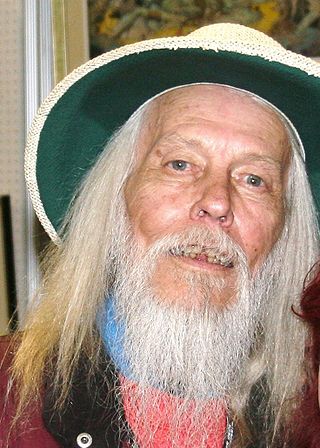Related Research Articles

Richard Burton Matheson was an American author and screenwriter, primarily in the fantasy, horror, and science fiction genres.

The Twilight Zone is an American media franchise based on the anthology television series created by Rod Serling in which characters find themselves dealing with often disturbing or unusual events, an experience described as entering "the Twilight Zone". The episodes are in various genres, including fantasy, science fiction, absurdism, dystopian fiction, suspense, horror, supernatural drama, black comedy, and psychological thriller, frequently concluding with a macabre or unexpected twist, and usually with a moral. A popular and critical success, it introduced many Americans to common science fiction and fantasy tropes. The first series, shot entirely in black-and-white, ran on CBS for five seasons from 1959 to 1964.

Rodman Edward Serling was an American screenwriter and television producer best known for his live television dramas of the 1950s and his anthology television series The Twilight Zone. Serling was active in politics, both on and off the screen, and helped form television industry standards. He was known as the "angry young man" of Hollywood, clashing with television executives and sponsors over a wide range of issues, including censorship, racism, and war.

"Where Is Everybody?" is the first episode of the American anthology television series The Twilight Zone and was originally broadcast on 2 October 1959, on CBS. It is one of the most realistic Twilight Zone episodes, as it features no supernatural elements and is based on fairly straightforward extrapolation of science.
"Judgment Night" is the tenth episode of the American television anthology series The Twilight Zone. In this episode, a passenger aboard a British cargo liner has no memory of how he came aboard, and is tormented by unexpected clues to his true identity and a sense that the ship is headed toward impending doom.
"I Shot an Arrow into the Air" is the fifteenth episode of the American television anthology series The Twilight Zone.

"The Big Tall Wish" is episode twenty-seven of the American television anthology series The Twilight Zone, with an original score by Jerry Goldsmith. It originally aired on April 8, 1960, on CBS. This was one of a few Twilight Zone episodes to feature black actors in lead roles, a rarity for American television of the era.
"The Mighty Casey" is episode thirty-five of the American television anthology series The Twilight Zone. Its title is a reference to the baseball poem "Casey at the Bat". It originally aired on June 17, 1960, on CBS. The episode was written by Rod Serling, and directed by Robert Parrish and Alvin Ganzer.
"A World of His Own" is episode thirty-six of the American television anthology series The Twilight Zone. It was the last episode of the show's first season and essentially comedic in tone. It originally aired on July 1, 1960, on CBS.
"The Invaders" is episode 15 of season 2 of the American television anthology series The Twilight Zone. The episode, which originally aired January 27, 1961, starred Agnes Moorehead. It was written by Richard Matheson, directed by Douglas Heyes, and scored by Jerry Goldsmith. Distinctive features of this episode include a near-solo performance by one character, and an almost complete lack of dialogue. The only dialogue in the entire episode aside from Rod Serling's usual narration came from Douglas Hayes, the episode's director. In addition, this is the only episode in which Rod Serling gives his opening monologue at the start of the prologue, rather than the end. The protagonist portrayed by Agnes Moorehead often cries out in pain and terror, but never speaks.

Emile Alphonse Griffith was a professional boxer from the U.S. Virgin Islands who won world titles in three weight divisions. He held the world light middleweight, undisputed welterweight, and middleweight titles. His best-known contest was a 1962 title match with Benny Paret. Griffith won the bout by knockout; Paret never recovered consciousness and died in the hospital 10 days later.

George Clayton Johnson was an American science fiction writer, who co-wrote with William F. Nolan the novel Logan's Run, the basis for the MGM 1976 film. He also wrote television scripts for The Twilight Zone, and the first telecast episode of Star Trek, entitled "The Man Trap". He also wrote the story and screenplay on which the 1960 and 2001 films Ocean's Eleven were based.
The Twilight Zone is a nationally syndicated radio drama series featuring radio play adaptations of the classic 1959–1964 television series The Twilight Zone. The series was produced for the British digital radio station BBC Radio 4 Extra airing for 176 episodes between October 2002 and 2012. In the United States, it aired on nearly 200 radio stations including WCCO, KSL, KOA, WIND, XM Satellite Radio channel 163 and Sirius XM Book Radio. Most of the stations aired two episodes each week, usually on the weekends and many times back to back.

The Twilight Zone is an American fantasy science fiction horror anthology television series created and presented by Rod Serling, which ran for five seasons on CBS from October 2, 1959, to June 19, 1964. Each episode presents a standalone story in which characters find themselves dealing with often disturbing or unusual events, an experience described as entering "the Twilight Zone", often with a surprise ending and a moral. Although often considered predominantly science-fiction, the show's paranormal and Kafkaesque events leaned the show much closer to fantasy and horror. The phrase "twilight zone" has entered the vernacular, used to describe surreal experiences.
"Raging Bender" is the eighth episode in the second season of the American animated television series Futurama, and the 21st episode of the series overall. It originally aired on the Fox network in the United States on February 27, 2000. The episode was written by Lewis Morton and directed by Ron Hughart. The story focuses on Bender becoming a professional robot wrestler.
Twilight Zone: Rod Serling's Lost Classics is a 1994 American made-for-television fantasy supernatural horror film consisting of two stories by Rod Serling. The film was co-produced by Serling's widow Carol Serling. Reportedly, she found the two pieces in a trunk in the family's garage.

Real Steel is a 2011 American science fiction sports film starring Hugh Jackman and Dakota Goyo and co-produced and directed by Shawn Levy for DreamWorks Pictures. The film is based on the short story "Steel", written by Richard Matheson, which was originally published in the May 1956 edition of The Magazine of Fantasy & Science Fiction, and later adapted into a 1963 Twilight Zone episode. The film features a former boxer (Jackman) whose sport is now played by robots. He must build and train his own robot with his son. Real Steel was in development for several years before production began on June 24, 2010. Filming took place primarily in the U.S. state of Michigan. Animatronic robots were built for the film, and motion capture technology was used to depict the rodeo brawling of computer-generated robots and animatronics, respectively.
Robot Combat League (RCL) is a U.S. television show on the Syfy network about robot fighting competitions. On the show, teams use exosuits to control fighting robots. The series is hosted by Chris Jericho and was first shown on February 26, 2013, at 10pm EST.
References
- ↑ AP (March 25, 1963). "Moore Second Champ to Die Within Year". Star-Gazette. p. 10. Retrieved May 31, 2017– via Newspapers.com.
- ↑ "Boxing changed forever when one man fought to the death -- on live television". SFGate. Retrieved 2017-04-22.
- DeVoe, Bill. (2008). Trivia from The Twilight Zone. Albany, GA: Bear Manor Media. ISBN 978-1-59393-136-0
- Grams, Martin. (2008). The Twilight Zone: Unlocking the Door to a Television Classic. Churchville, MD: OTR Publishing. ISBN 978-0-9703310-9-0
- Zicree, Marc Scott: The Twilight Zone Companion. Sillman-James Press, 1982 (second edition)